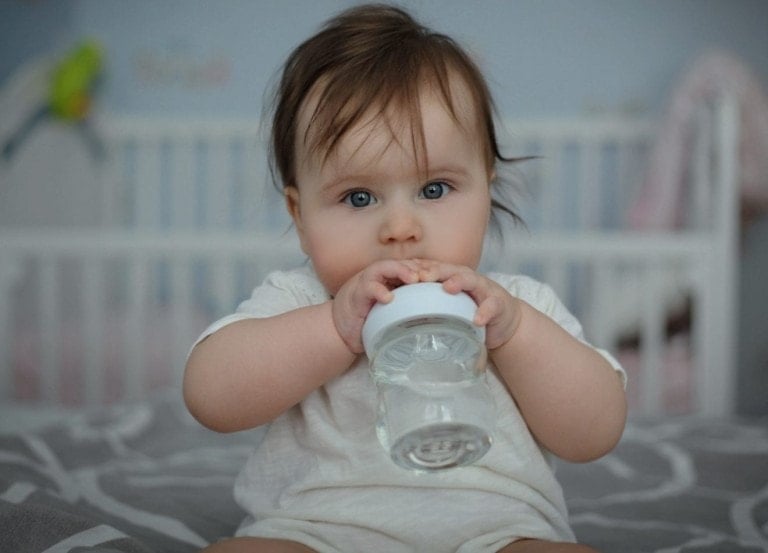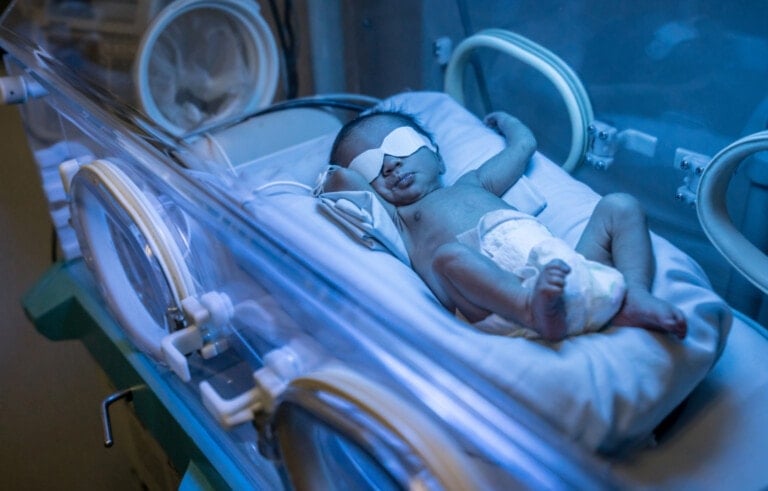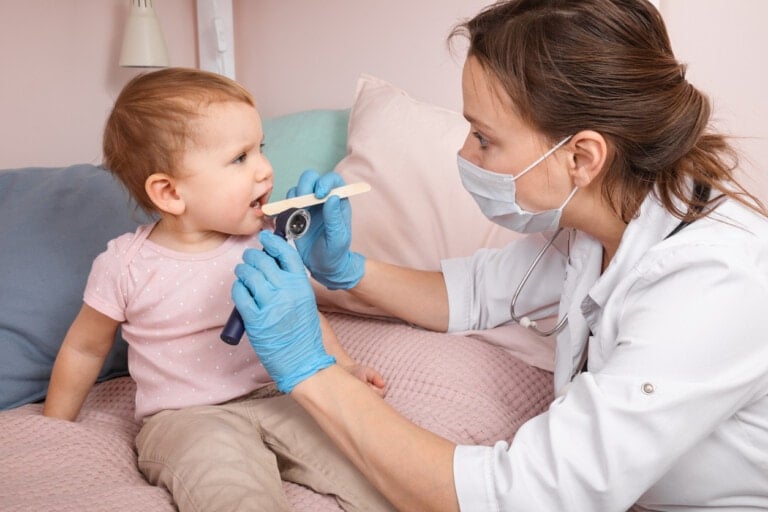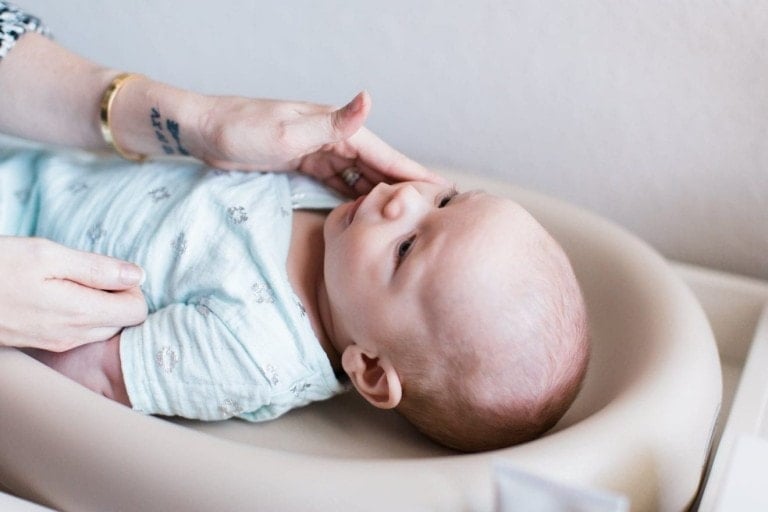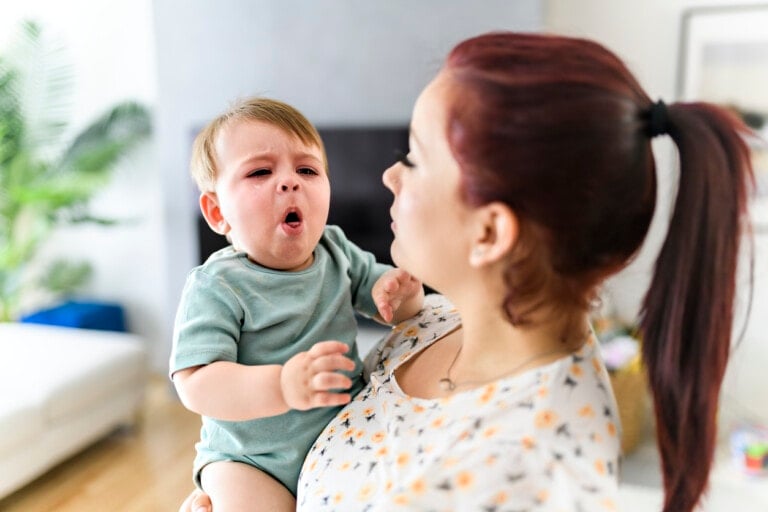Your baby is crying. They have a runny, stuffy, yucky nose and won’t eat. They are cutting teeth and have a fever. What should you worry about first? The possibility of a baby ear infection. Acute otitis media, the scientific name for a middle ear infection, is the most common reason parents take their sick baby to the doctor. It’s also the most common bacterial infection treated with antibiotics in children and babies.1,2
Baby ear infections are tricky for several reasons. First, babies can’t tell you what hurts; they just cry. Second, their ear and sinus anatomy make them prone to ear infections. Third, they are exposed to many new germs and viruses, and their body has not yet built any immunity. So, they always seem to have a runny nose or cough, or both, and they can lead to a baby ear infection.2
What is a Baby Ear Infection?
A middle ear infection happens when the eustachian tube swells due to an upper respiratory cold or virus, or bacterial infection. See a picture of the ear’s anatomy below.3
The swelling of the eustachian tube causes fluid or mucus to build up behind the ear drum in the middle ear. This fluid usually drains down into the back of the throat, but it grows bacteria when it can’t drain properly. A warm, moist environment is perfect for growing bacteria, leading to a baby ear infection.2
Why are Babies and Children More Likely Than Adults to Get Ear Infections?
Babies’ immune systems are still developing, making fighting off an ear infection harder. Also, their eustachian tube anatomy makes them more prone to ear infections. In babies, the eustachian tube is smaller and more horizontal than in adults, so it doesn’t always drain properly. Adults are also more aware of their bodies and what is normal for them, so something abnormal can be noted much more quickly by an adult.2
Signs and Symptoms of a Baby Ear Infection
The signs and symptoms of a baby ear infection can vary and sometimes even be challenging to decipher in babies. For a middle ear infection, there are only a few easy signs you might notice, such as the following:2
- Tugging and pulling at the ears
- Fluid draining out of the ear
- Ear pain, if your child can tell you
Other, more vague, signs and symptoms that could mean other problems include:2
- Fussiness and crying
- Trouble sleeping
- Difficulty feeding with breast or bottle or a loss of appetite
- Fever
- Loss of balance
- Not hearing well
When to Call the Doctor
Some baby ear infections will improve on their own in about 48-72 hours by giving the child lots of fluids, rest, and over-the-counter (OTC) pain relievers such as acetaminophen or ibuprofen. Ibuprofen tends to work better for ear infections because it has anti-inflammatory properties, which help to decrease the swelling in the middle ear.2
Always remember that no matter what, you know your child better than anyone else, including the doctors and nurses. If you feel something more than a cold is going on with your child, call your child’s pediatrician.
How to Prevent Baby Ear Infections
You cannot always prevent baby ear infections. But there are some things that you can do to help reduce the risk factors, like the following:
- Breastfeeding a baby for at least six months can help reduce the risk of baby ear infections by strengthening their immune system.1
- Avoid propping up a bottle to feed your baby. This can lead to the liquid pooling in the back of the throat and getting into the eustachian tubes, leading to an ear infection.1
- Smoking around babies and children has been proven to increase ear infections. Secondhand or passive smoke can irritate the respiratory tract, which leads to swelling in the eustachian tubes.6
- Washing hands frequently to prevent catching a cold or the flu and try to keep sick children away from other children.2
Baby Ear Infection Treatment
The most common treatment for a baby’s ear infection is a course of antibiotics. These are usually prescribed for a 7-to-10-day period. They might feel better and eat normally again after a few days of the antibiotic. Still, it’s important to give your child all doses of the medication (or until it’s all gone if you run out before all doses can be given) so all the bacteria are cleared from the ear. Call your doctor if they aren’t feeling better after two to three days on the antibiotic. They may need a different antibiotic to attack the infection.1
Follow the Doctor’s Instructions
If your doctor gives you a follow-up appointment to re-check the ears, it’s essential to keep that appointment in case the infection is not entirely gone. Also, ibuprofen (if your doctor approves it) is helpful in the first two days of the infection, especially at bedtime. It helps reduce the swelling in the inner ear and eustachian tubes to decrease the pain.1,2
Sometimes your doctor will give you an antibiotic prescription but ask you to wait 48-72 hours before filling it to see if your child will fight off the ear infection on their own without the medication. This is a common practice to help prevent antibiotic-resistant bacteria from developing.1,2
Anyone can get an ear infection, but it is more likely to happen in children than adults. Baby ear infections are a basic fact of life for most parents since five out of six children will have an ear infection before they turn three. According to the National Institutes for Health (NIH), there is research being done by the National Institute on Deafness and Other Communication Disorders (NIDCD) to explore ways to help improve the prevention, diagnosis, and treatment of middle ear infections.2
Until the experts or someone else can wave a magic wand to make our children “all better,” we just need to be the best parents we can be and deal with baby ear infections as they happen.

























